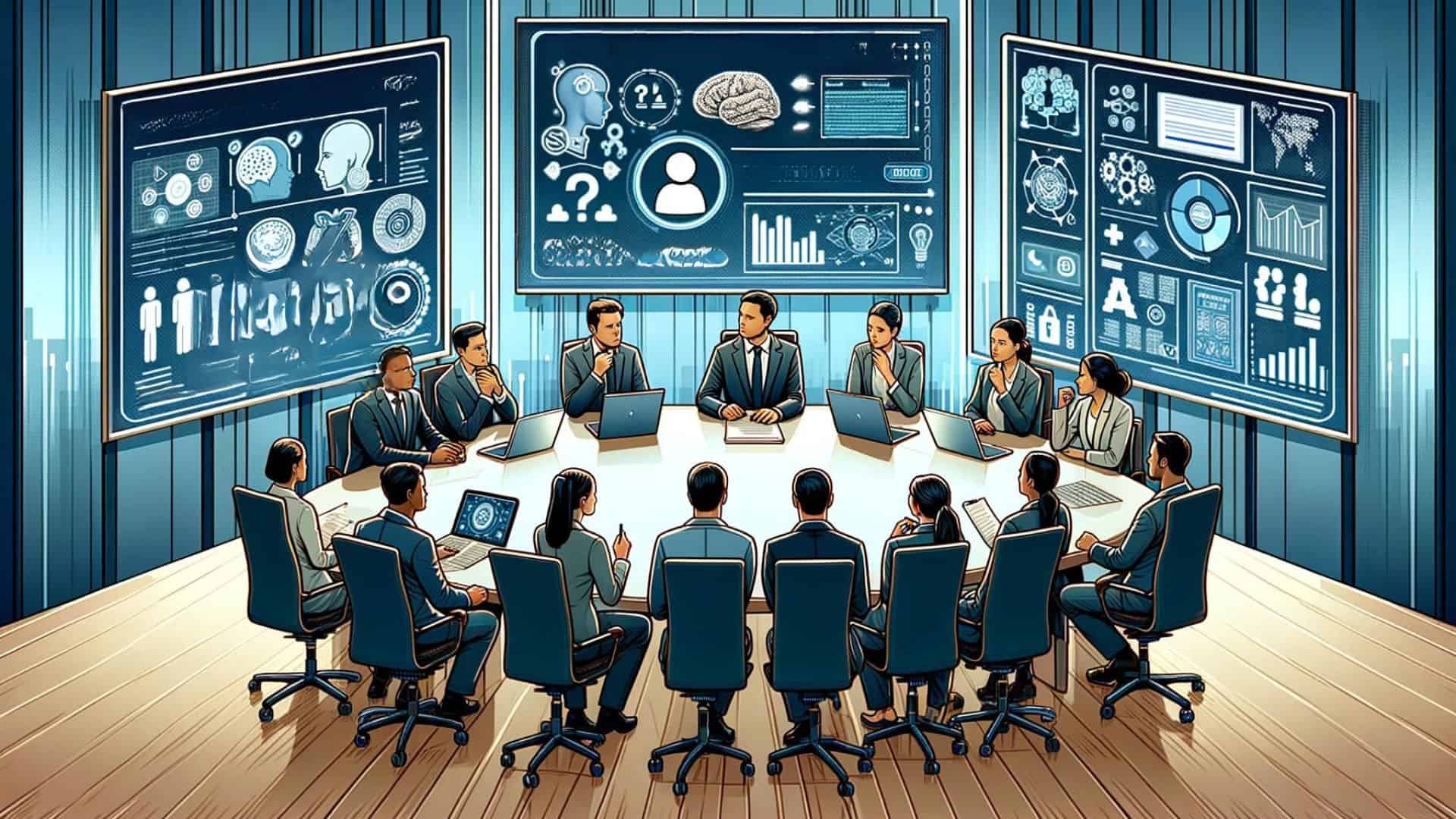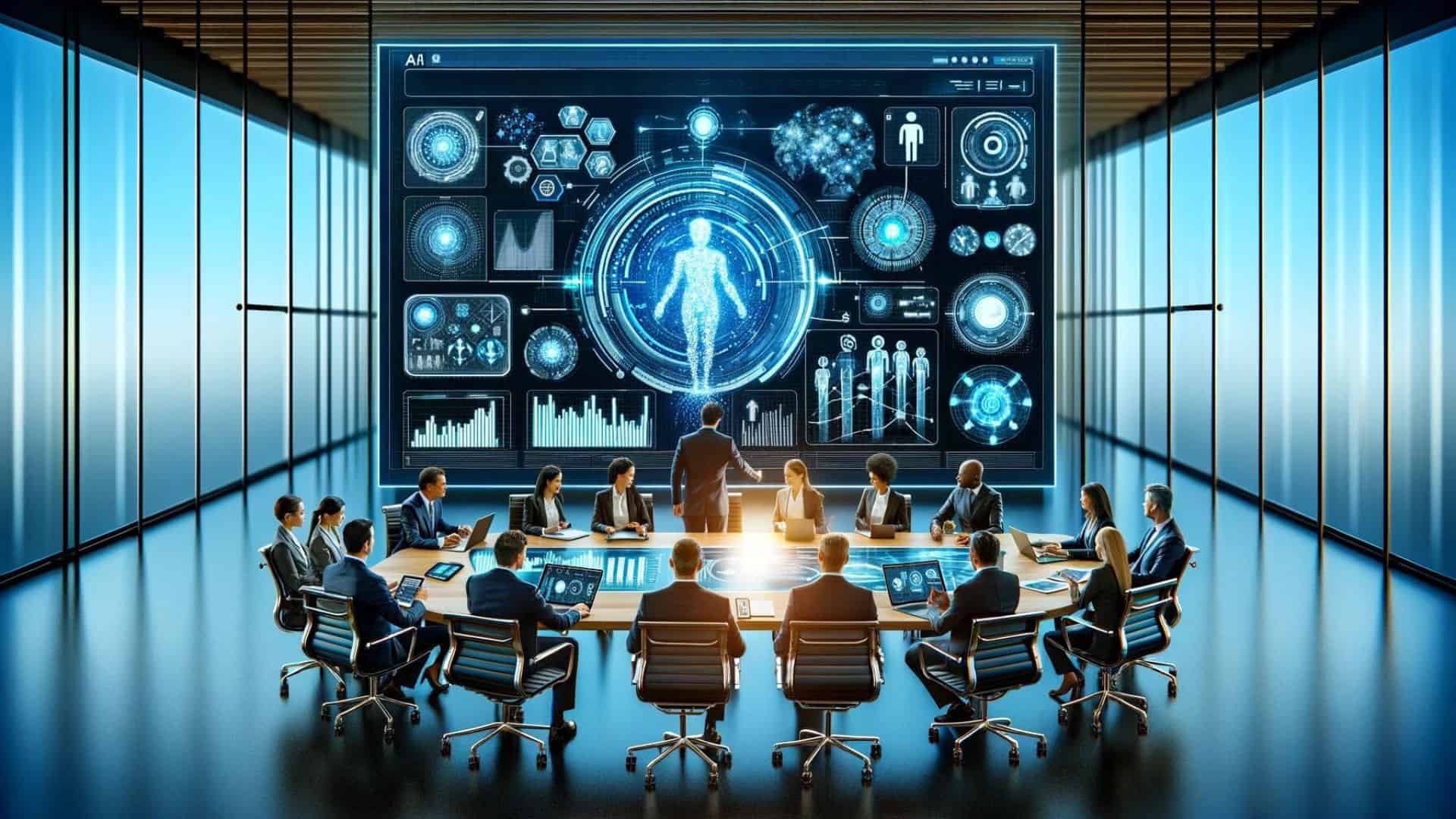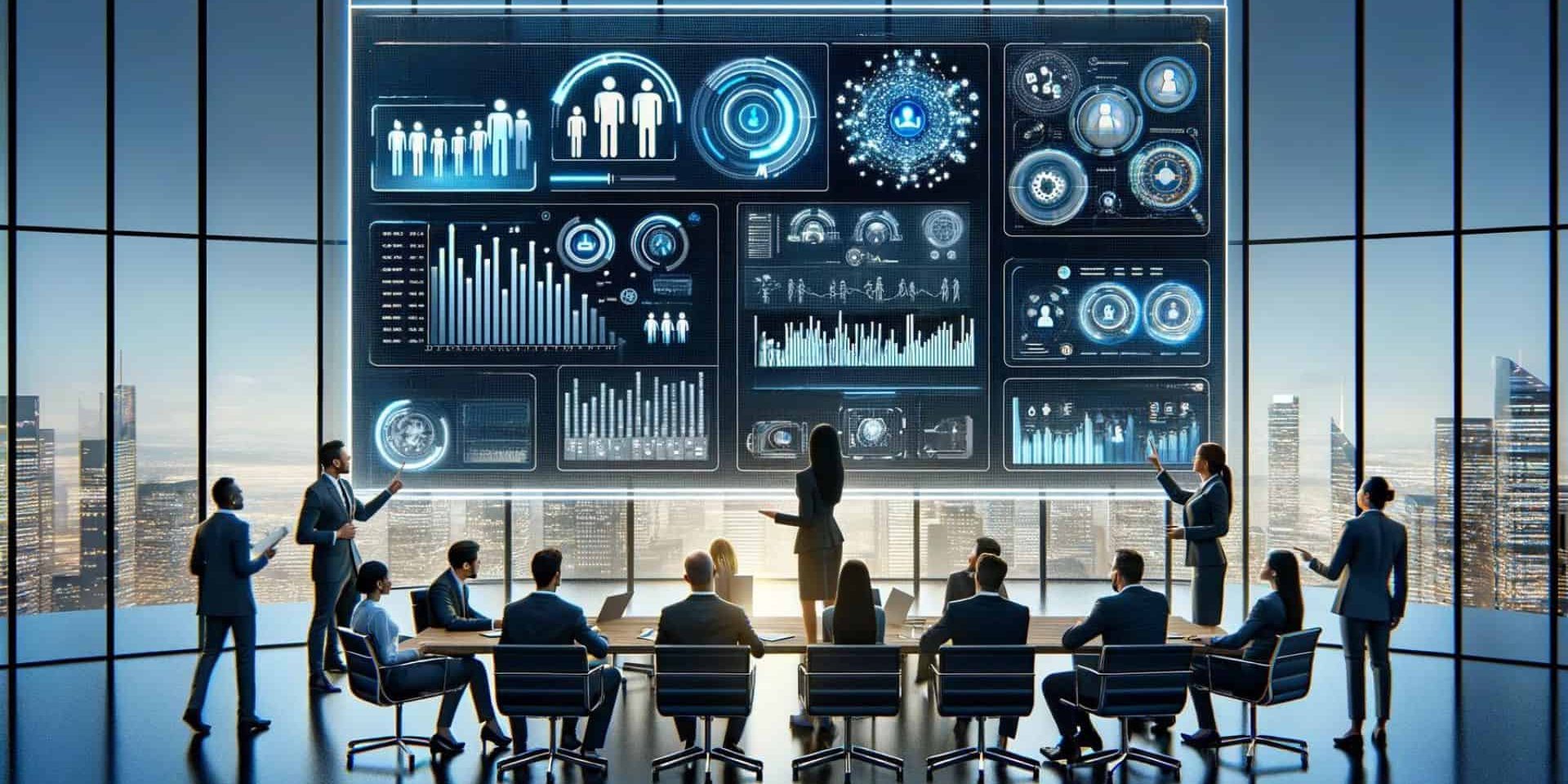AI in Human Resource Management is transforming the sector with advanced tools for recruitment, onboarding, employee development, retention, HR analytics, and decision-making, through the integration of Artificial Intelligence (AI). As AI continues to advance, HR professionals are leveraging these technologies to enhance efficiency, make data-driven decisions, and address the challenges of modern HR practices. This article delves into the various capabilities of AI in HRM, exploring how it is transforming the field while also considering the ethical implications and prospects.
Key Takeaways
- AI-enhanced recruitment and onboarding tools streamline hiring processes, improve new employee experiences, and promote diversity and inclusion.
- AI-driven employee development programs and retention strategies are personalized and predictive, offering real-time feedback and performance insights.
- AI applications in HR analytics and decision-making processes provide data-driven insights, enhance workforce planning, and measure employee engagement.
- Challenges in implementing AI in HR include addressing algorithmic bias, ensuring data privacy, and maintaining a balance between AI and human judgment.
- The future of HR involves integrating AI into HR strategies, preparing teams for AI adoption, and evaluating AI’s long-term impact on HR practices.
AI-Enhanced Recruitment and Onboarding

Streamlining the Hiring Process with AI
The advent of AI in recruitment is transforming the landscape of HR, offering tools that automate and refine the hiring process. AI-driven systems are adept at sifting through vast numbers of resumes, identifying the most promising candidates by focusing on skills and experience rather than personal identifiers. This not only speeds up the recruitment cycle but also promotes fairness and reduces unconscious bias.
Here’s how AI streamlines hiring:
- Based on job requirements, AI algorithms parse and rank resumes quickly.
- Chatbots engage candidates by providing timely responses and scheduling interviews.
- Predictive analytics forecast candidate success, aiding in making informed hiring decisions.
Embracing AI in recruitment allows HR teams to allocate more time to strategic tasks, ensuring a more efficient and equitable hiring process. With AI, companies can focus on what truly matters—finding the right talent to drive their success.
The integration of AI Account Software further streamlines financial processes within HR, enhancing expense management and providing efficient implementation steps. As HR departments adopt these advanced tools, they are poised to revolutionize the efficiency and effectiveness of their recruitment strategies.
Automating Onboarding for a Smooth Start
The integration of AI into the onboarding process marks a significant leap toward efficiency and employee satisfaction. Automating onboarding tasks not only saves time but also ensures a consistent experience for every new hire. From digital offer letters to setting up profiles on the company’s systems, AI streamlines the entire process.
AI-driven onboarding systems can personalize the experience for new employees, making them feel welcomed and well-informed from day one.
Here are some of the key features that AI can automate in the onboarding process:
- Customizable profile templates
- Asset tracking
- Absence management
- Health and wellness program integration
- Orientation and training schedules
- Real-time leave request management
- Expense claim automation
- Instant performance feedback mechanisms
By leveraging these AI capabilities, HR departments can focus on more strategic tasks, such as employee engagement and retention, while new hires are equipped with all the tools they need to start contributing to the company immediately.
Leveraging AI for Diverse and Inclusive Hiring
The integration of AI into the hiring process is a game-changer for achieving diversity and inclusivity in the workplace. AI-powered tools are designed to identify the best candidates based on skills and qualifications, rather than subjective criteria, which can inadvertently lead to bias. By analyzing vast amounts of data, AI can help HR teams make more informed decisions, ensuring a fairer selection process.
AI-driven recruitment also offers the advantage of predictive analytics. By evaluating historical data and current trends, AI can predict which candidates are likely to succeed in a role, helping to create a more diverse and effective workforce.
The promise of AI in hiring is not just about efficiency; it’s about fundamentally transforming the recruitment landscape to be more equitable and inclusive.
Here’s a snapshot of how AI is revolutionizing the hiring process:
- Screening resumes with precision and speed
- Reducing unconscious bias by focusing on skills and experience
- Predicting candidate success with data-driven insights
Embracing AI in recruitment means committing to a future where every candidate has an equal opportunity to be seen and considered, and where HR teams can dedicate more time to strategic initiatives rather than administrative tasks.
AI-Driven Employee Development and Retention

Utilizing AI for Personalized Training Programs
The advent of AI in HR has revolutionized the way employee training programs are designed and delivered. AI-driven platforms can now offer personalized learning experiences that cater to the individual needs and learning styles of employees. This personalization is not only more engaging but also more effective in enhancing employee skills and knowledge.
Personalized training programs powered by AI can analyze an employee’s performance data, learning pace, and preferences to tailor the training content accordingly. This ensures that each employee receives the most relevant and impactful training, leading to improved job performance and satisfaction.
By leveraging AI, companies can create a dynamic learning environment that adapts to the evolving needs of their workforce.
Here are some of the key functionalities provided by AI in personalized training:
- Employee Onboarding: Streamlines the integration of new hires into the company culture and processes.
- Employee Wellness: Offers tailored wellness programs to support employee health.
- Employee Training: Delivers customized orientation plans for new hires.
- Employee 360 Feedback: Facilitates real-time feedback for ongoing employee development.
- Employee Performance Review: Enables continuous assessment and goal setting for career growth.
Implementing AI in training programs not only enhances the learning experience but also contributes to increased productivity, cost savings, and efficiency in human resource management. It is essential, however, that the adoption of such technology be accompanied by comprehensive training and ongoing support to ensure successful integration into the HR ecosystem.
Predictive Analytics for Employee Retention
The application of predictive analytics to employee retention is transforming HR’s approach to talent management. By analyzing patterns in employee data, AI can identify potential risks of attrition and provide actionable insights to prevent it. This proactive stance allows companies to address issues before they lead to turnover, ensuring a more stable and engaged workforce.
Predictive analytics tools can forecast which employees are likely to leave and why, enabling HR to intervene with targeted retention strategies.
Key benefits of using predictive analytics for employee retention include:
- Identifying high-risk turnover groups
- Understanding the underlying causes of employee dissatisfaction
- Tailoring retention programs to individual needs
By leveraging AI-driven insights, HR professionals can not only retain valuable employees but also create a more positive work environment that fosters loyalty and productivity.
AI Tools for Continuous Performance Feedback
The integration of AI tools in performance feedback mechanisms marks a transformative step in HR management. AI-driven systems offer real-time insights into employee performance, enabling a more dynamic and responsive approach to talent development. These tools not only facilitate immediate feedback but also allow for the tracking of progress over time, ensuring that employees and managers can work together to achieve continuous improvement.
AI account software enhances expense tracking with features like workflows, receipt scanning, and payment integration. It enables data-driven financial analysis for informed decision-making and predictive cash flow management. This is just one example of how AI can streamline administrative tasks, freeing up HR professionals to focus on more strategic initiatives.
The use of AI in performance feedback is not just about efficiency; it’s about creating a culture of ongoing development and support. AI tools can identify patterns and provide actionable insights that help employees grow and succeed in their roles.
The following list highlights some of the key functionalities that AI tools bring to performance feedback systems:
- Multi-Location
- 360-Degree Feedback
- Feedback Management
- Surveys & Feedback
- Dashboard
- Strategic Planning
- Activity Tracking
- Analytics
- Scheduling
- Approval Process Control
- Contract Management
- Alerts/Notifications
- User Activity Monitoring
- Customizable Templates
- Rewards Program
- Reporting
- Excel Import
- Talent Management
- Job Management
- Self-onboarding
- Assessment Management
- Data Analysis
- Multi-User Collaboration
- Templates
- Integrations
- Data Import / Export
AI in HR Analytics and Decision Making

Enhancing HR Decisions with Data-Driven Insights
The integration of AI into HR management has revolutionized the way decisions are made, offering a level of precision and foresight that was previously unattainable. AI-driven analytics tools sift through vast amounts of employee data, transforming it into actionable insights that can lead to more informed decision-making. This not only enhances efficiency but also ensures that HR strategies are aligned with overall business goals.
Data-driven insights allow HR professionals to understand workforce trends and predict future needs, making HR a strategic partner in the growth of the company. By leveraging these insights, HR can tailor experiences to individual employees, leading to a more engaged and productive workforce.
With AI, HR is no longer just a support function but a strategic entity capable of driving real business outcomes.
The following list highlights some of the key benefits of using AI for data-driven HR decisions:
- More accurate talent acquisition and retention strategies
- Enhanced understanding of employee satisfaction and engagement levels
- Improved prediction of workforce trends and requirements
- Streamlined HR processes, freeing up time for strategic initiatives
Embracing AI in HR not only transforms the department into a powerhouse of efficiency and fairness but also positions it as a crucial contributor to the organization’s success.
Predictive Modeling in Workforce Planning
The integration of predictive modeling in workforce planning is a game-changer for HR professionals. By analyzing historical data and identifying patterns, AI systems can forecast future staffing needs with remarkable accuracy. This foresight allows organizations to proactively address talent gaps and optimize their workforce composition for upcoming challenges and opportunities.
Predictive analytics are not just about forecasting; they’re about creating strategic value. For instance, AI account software enhances financial decision-making with predictive analytics for planning, risk assessment, and mitigation, enabling businesses to make informed decisions and optimize financial performance. Similarly, in HR, predictive models can anticipate employee turnover, pinpointing which employees are at risk of leaving and allowing for timely interventions.
Predictive modelling transforms raw data into actionable insights, empowering HR to make data-driven decisions that align with long-term business strategies.
Here’s how predictive modeling can be applied to various HR functions:
- Talent Management: Identifying potential leaders and planning succession.
- Performance Management: Predicting performance trends and training needs.
- Benefits and Compensation: Forecasting the impact of benefits on employee satisfaction and retention.
- HR Technology: Enhancing HR information systems with predictive capabilities.
AI for Measuring and Improving Employee Engagement
The integration of AI into HR practices has revolutionized the way employee engagement is measured and improved. AI tools are now pivotal in analyzing employee feedback, surfacing insights that might otherwise go unnoticed. These tools can dissect vast amounts of data from surveys, performance metrics, and social interactions to provide a comprehensive view of engagement levels across the organization.
AI account software automates payroll management, provides insights, ensures compliance with regulations, and offers data analysis for informed financial decision-making in small businesses. This automation extends to employee engagement, where AI can identify patterns and trends that inform HR strategies to boost morale and productivity.
By leveraging AI, companies can transition from a reactive to a proactive stance on employee engagement, tailoring initiatives to the workforce’s evolving needs.
Here’s a glimpse of how AI contributes to enhancing employee engagement:
- Personalizing employee experiences from onboarding to ongoing development.
- Providing real-time feedback mechanisms for continuous improvement.
- Analyzing complex employee data to unlock insights for better decision-making.
The future of HR is undeniably intertwined with AI, and its role in fostering a dynamic and engaged workforce is just beginning to unfold.
Challenges and Ethical Considerations in AI for HR

Addressing Bias and Fairness in AI Algorithms
The integration of AI in HR processes has the potential to revolutionize the way organizations handle recruitment, employee development, and retention. However, a critical challenge that emerges is the presence of bias within AI algorithms. Ensuring fairness and objectivity in AI-driven decisions is paramount to maintaining trust and equity in the workplace.
To address these concerns, HR departments must adopt a multi-faceted approach:
- Regularly auditing AI tools for potential biases.
- Implementing diverse training datasets to minimize skewed outcomes.
- Establishing transparent AI decision-making processes.
It is essential for HR professionals to collaborate with AI developers to create algorithms that reflect the organization’s commitment to diversity and inclusion.
Moreover, integrating AI account software requires careful consideration of training, data privacy, and data security to reduce human error and enhance efficiency. By prioritizing these aspects, HR can leverage AI to not only streamline operations but also uphold the highest standards of fairness and ethics in the workplace.
Maintaining Privacy and Data Security
In the realm of Human Resource Management, the integration of AI systems necessitates a robust framework for maintaining privacy and data security. As HR departments handle sensitive employee information, it’s imperative to ensure that AI tools adhere to strict data protection standards.
Confidentiality is a cornerstone of HR practices, and AI solutions must be designed with encryption and access controls to safeguard personal data. The following list outlines key measures for securing HR data in AI applications:
- Implementation of end-to-end encryption for data at rest and in transit
- Regular security audits and compliance checks
- Advanced user authentication protocols
- Data anonymization techniques to protect employee identities
- Clear policies on data retention and deletion
Ensuring these security measures are in place is critical to prevent unauthorized access and data breaches, which could have severe repercussions for both employees and the organization.
Balancing AI and Human Judgment in HR
While AI has the potential to revolutionize HR practices, it is essential to maintain a balance between automated processes and the irreplaceable human touch. AI should augment, not replace, the nuanced human judgment required in HR. To achieve this balance, HR professionals can employ strategies such as continuous training in AI applications and setting clear ethical guidelines.
AI account software helps businesses automate compliance processes, interpret complex regulations, keep up with changes, and manage multiple regulations, improving efficiency and reducing non-compliance risk. However, these tools must be used to support, not supplant, the expertise of HR personnel.
The integration of AI in HR should be approached with a focus on complementing human intelligence, empathy, and understanding, ensuring that technology serves to enhance rather than diminish the human elements of HR services.
The Future of HR: Integrating AI into HR Strategy

Preparing HR Teams for AI Adoption
As organizations prepare to integrate artificial intelligence into their HR strategies, it is crucial to equip HR teams with the necessary skills and knowledge. Embracing AI requires a shift in mindset and a willingness to adapt to new technologies that can enhance HR processes. Training programs should focus on familiarizing HR professionals with AI tools and their applications in various HR functions.
Understanding AI capabilities
- Recognize the potential of AI in streamlining HR tasks
- Identify opportunities for AI to support decision-making
- Develop strategies to leverage AI for improved employee experiences
To ensure a smooth transition, HR teams must also be aware of the ethical implications of AI, including the importance of maintaining fairness and privacy. Continuous learning and development will be key to staying abreast of AI advancements and integrating them effectively into HR practices.
By fostering a culture of innovation and continuous improvement, HR teams can become more strategic and impactful in their roles, leveraging AI to drive organizational success.
Innovative AI Solutions for Strategic HR
The integration of AI into strategic HR practices is transforming the landscape of human resource management. AI-driven tools are not only automating routine tasks but are also enabling HR teams to focus on more strategic initiatives. For instance, AI account software is pivotal in optimizing cash flow, identifying cost-saving opportunities, and making data-driven decisions for financial efficiency and growth.
- Algorithms for Talent Prediction
- AI-driven employee wellness programs
- Integration of AI in strategic decision-making
These innovations signify a shift towards a more analytical and proactive approach to HR. The future-ready HR team embraces AI for innovative solutions, unlocking new possibilities for strategic engagement and impact.
The combination of human intelligence and AI brings a new level of sophistication to HR practices, enhancing efficiency and decision-making while analyzing complex employee data to unlock insights that improve HR functions.
Evaluating the Long-Term Impact of AI on HR
The long-term impact of AI on HR is profound, with the potential to redefine the landscape of human resource management. AI’s integration into HR practices is not merely a trend but a transformative shift towards more efficient and data-driven operations. As AI technologies evolve, they promise to elevate HR services, enhance decision-making, and streamline processes.
AI account software, like AI HRMS, exemplifies this evolution, offering comprehensive functions that cater to the nuanced needs of small to medium-sized organizations. The software streamlines financial processes, enhances decision-making, and increases data security, marking a significant leap in HR service and efficiency.
To fully harness the benefits of AI in HR, organizations must:
- Choose the right AI solutions that align with their HR goals
- Integrate these solutions with existing systems seamlessly
- Train employees to effectively utilize AI tools
- Address resistance to change through clear communication and support
- Ensure data accuracy and integrity to maintain trust in AI-driven decisions
Embracing AI in HR requires a strategic approach, balancing the technological capabilities with the human elements of HR services. It’s about augmenting human intelligence, not replacing it, and preparing HR teams for a future where AI is an indispensable ally.
As we navigate the evolving landscape of human resources, integrating AI into HR strategy becomes imperative for forward-thinking organizations. AI HRMS is at the forefront of this transformation, offering cloud-based, customizable HR management software tailored to the unique needs of SMEs. Embrace the future of HR and enhance your talent management with our comprehensive suite of tools, including employee onboarding, wellness programs, and performance reviews. Discover how AI HRMS can revolutionize your HR processes by visiting our website and taking the first step towards a smarter HR strategy.
Conclusion:
The integration of AI into Human Resource Management signifies a transformative leap forward for the field. As we have explored, AI’s capabilities range from streamlining recruitment processes to providing sophisticated HR Information Systems that enhance decision-making and efficiency. The AI HRMS platform, with its comprehensive suite of tools, exemplifies how technology can be tailored to the unique needs of SMEs, offering an affordable, scalable solution for managing HR tasks. While challenges such as maintaining the human touch and addressing biases in AI algorithms persist, the strategic implementation of AI in HR departments promises a future where HR practices are not only more efficient but also more equitable and data-driven. As AI continues to evolve, it is poised to revolutionize the role of HR professionals, enabling them to focus on strategic, impactful work and fostering a more dynamic, responsive approach to managing human capital.
Frequently Asked Questions
How does AI-enhanced recruitment benefit HR processes?
AI-enhanced recruitment streamlines HR processes by automating resume scanning, conducting initial candidate assessments, and potentially performing first-level interviews. This not only saves time but also helps reduce human bias, leading to a more equitable hiring process.
In what ways does AI contribute to employee onboarding?
AI contributes to employee onboarding by providing customizable profile templates, asset tracking, and absence management modules. It facilitates a smooth start for new hires and integrates wellness programs to maintain employee well-being.
Can AI improve employee retention and development?
Yes, AI can improve employee retention and development through personalized training programs, predictive analytics to anticipate turnover and continuous performance feedback tools that help employees grow and stay engaged.
What are the challenges of implementing AI in HR?
The challenges of implementing AI in HR include addressing potential biases in AI algorithms, ensuring privacy and data security, and balancing the use of AI tools with the need for human judgment and the human touch in HR services.
How does AI HRMS cater to the needs of SMEs?
AI HRMS caters to the needs of SMEs by offering an affordable, cloud-based solution with comprehensive functionalities like employee onboarding, wellness programs, leave and claim management, and performance reviews, which are customizable to individual business needs.
What is the future of AI in HR management?
The future of AI in HR management is promising, with technologies evolving to provide more sophisticated applications. AI is expected to make HR practices more efficient, data-driven, and unbiased, significantly transforming the role of HR professionals.








